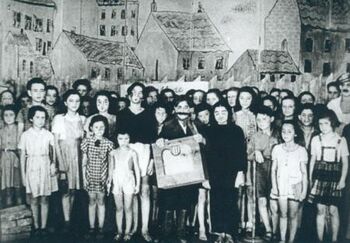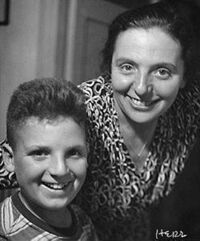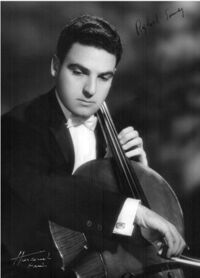Raphael Sommer / Stefan Herz-Sommer (M / Czechia, 1937-2001), Holocaust survivor
Raphael Sommer / Stefan Herz-Sommer (M / Czechia, 1937-2001), Holocaust survivor.
- One of the main interpreters of Brundibar
- KEYWORDS : <Theresienstadt> <Liberation of Theresienstadt>
Biography
Raphael Sommer, musician, was born June 21, 1937 at Prague, Czechia; died November 13, 2001 at Tel Aviv-Yafo, Israel.
The Guardian (28 November 2001)
- Cellist whose musical flair survived a concentration camp, by Louise Greenberg.
In Terezin, Raphael, who has died of an aneurysm of the aorta aged 64, turned the pages at every weekly concert his mother, Alice Herz-Sommer, a Czech concert pianist, was forced to perform, in addition to forced labour. He also performed the role of the sparrow in the camp production of Hans Krasa's fable about tyranny, Brundibar. Years later, he conducted many memorable performances of the opera.
Raphael Sommer, who had been born in Prague, was one of only a handful of children to survive Terezin. He was sent to the camp with his parents in July 1943; a year later, his father, Leopold, was moved to Dachau, where he died six weeks before it was liberated. Mother and son were billeted in a narrow room with 16 other inmates, but fortunately remained together.
After the war, they reached Israel, where Alice became a teacher and Raphael a pupil at the Rubin Academy in Jerusalem. His first instrument was, reluctantly, the piano until, at the age of 11, he embarked on a happy and enduring relationship with the cello. Lessons with Paul Tortelier in Israel led to a scholarship for further study at the Paris Conservatoire.
A succession of prizes and outstanding debut performances, followed by a season with Rudolf Serkin at the Marlboro festival in Vermont, consolidated his reputation. The Finnish cellist, Arto Noras, also a Tortelier pupil, emphasises that for Raphael, "the essential was the composer. He always tried to avoid any kind of artificial effects or instrumental mannerisms, which string players so often carry from one composition to another."
In 1967, a parallel career as a highly respected teacher began when Raphael took over the cello department of the Royal Northern College of Music in Manchester. In 1989, he became professor at the Guildhall School of Music and Drama, in London, as well as a judge of international competitions.
Raphael wrote that "one of the greatest pleasures of music is to make other people listen to it; to feel, for just a moment, a tiny part of an ideal world in which everything is good, beautiful, harmony, love". It was this that inspired him and his wife, the French cellist, Geneviève Teullières, to establish a music festival in Gex, where they had a home.
Sommer's gifts as a recitalist found their most recent expression in the chamber ensemble Trio Salomon, which had just completed a hugely successful tour of Israel when he became unwell and was taken to hospital.
After taking part, with his mother, in a radio documentary about the music of Terezin, Sommer wrote and presented talks programmes, including a profile of Tortelier and the series Manners; as its producer, I found he was that rare phenomenon, a musician who could write as well as he played.
Despite his harsh childhood experiences, his success was achieved "without elbows" - that is, by beautiful playing rather than by clever management. He cherished his private life and nurtured friendships as much as his career, read widely and enjoyed theatre.
One friend said that Sommer bound his friends to him with "hoops of steel". When invited to visit for a meal, a guest was likely to meet the same people each time. Companionship and affection were his purposes, not networking, and he was as loyal to his friends as to the composers he interpreted.
Sommer is survived by his mother, his wife, and two sons from his earlier marriage to Sylvie Ott. Still active at 98, Alice Sommer was recording an interview about the Terezin years for German television when her grandsons told her of Raphael's death.
Find a Grave
Spent 2 years as a child in the Nazi concentration camp at Terezin, 35 miles outside Prague, with his mother.
In Terezin, Raphael turned the pages at every weekly concert his mother, Alice Hertz Sommer, a Czech concert pianist, was forced to perform, in addition to forced labor. He also performed the role of the sparrow in the camp production of Hans Krasa's story about tyranny, "Brundibar." Years later, he conducted many performances of the opera.
Raphael was one of only a handful of children to survive Terezin. Mother and son were held in a narrow room with 16 other inmates, but fortunately remained together. His father and grandmother were sent to Auschwitz, where his grandmother was murdered. His father ultimately was sent to Dachau and murdered there.
After the war, they reached Israel, where Alice became a teacher and Raphael a pupil at the Rubin Academy in Jerusalem. His first instrument was the piano until, at the age of 11, he embarked on a happy and enduring relationship with the cello. Lessons with Paul Tortelier in Israel led to a scholarship for further study at the Paris Conservatory.
A succession of prizes and outstanding debut performances, followed by a season with Rudolf Serkin at the Marlboro festival in Vermont created his reputation. The Finnish cellist, Arto Noras, also a Tortelier pupil, emphasized that for Raphael, "the essential was the composer. He always tried to avoid any kind of artificial effects or instrumental mannerisms, which string players so often carry from one composition to another."
In 1967, a career as a highly respected teacher began when Raphael took over the cello department of the Royal Northern College of Music in Manchester. England. In 1989, he became professor at the Guildhall School of Music and Drama in London, as well as a judge of international competitions.
Raphael wrote that "one of the greatest pleasures of music is to make other people listen to it; to feel, for just a moment, a tiny part of an ideal world in which everything is good, beautiful, harmony, love". This feeling is what inspired him and his wife, the French cellist, Geneviève Teullières, to establish a music festival in Gex, where they had a home.
After taking part, with his mother, in a radio documentary about the music of Terezin, Sommer wrote and presented talk programs, including a profile of Tortelier and the series Manners.
Despite his terrible childhood experiences, his success was achieved by beautiful playing rather than by clever management. He cherished his private life and nurtured friendships as much as his career, read widely and enjoyed the theater.
Sommer's gifts as a recitalist found their most recent expression in the chamber ensemble Trio Salomon, which had just completed a hugely successful tour of Israel when he became unwell and was rushed to the hospital.
Sommer is survived by his mother, his wife, and two sons from an earlier marriage. Still active at 98, Raphael's mother Alice was recording an interview about the Terezin years for German television when her grandsons told her of Raphael's death.
Classical Music Daily
'One of the greatest pleasures of music is to make other people listen to it; to feel, for just a moment, a tiny part of an ideal world in which everything is good, beautiful, harmony, love.' - Raphael Sommer
Cellist and teacher Raphael Sommer was born in Prague on 21 June 1937 and was one of the very few children to survive Terezin, protected by his concert pianist mother Alice Hertz Sommer. After the war, in Jerusalem, Alice taught and Raphael studied at the Rubin Academy. He discovered the cello at the age of eleven, took lessons with Paul Tortelier in Israel and won a scholarship to the Paris Conservatoire.
He gave recitals, won competitions, and was also gifted as a writer and speaker. In 1967 he began teaching, first running the cello department at Manchester's Royal Northern College of Music and then becoming a professor at London's Guildhall School of Music and Drama. The wish to share the love of and in music inspired Sommer and his wife, French cellist Geneviève Teulières, to create a music festival at Gex in eastern France.
Raphael Sommer died suddenly on 13 November 2001, whilst touring Israel with the Salomon Trio. Alice and Geneviève subsequently created the Raphael Sommer Music Scholarship in 2002, awarded annually to a talented young cellist.
Celloheaven.com
Raphaël SOMMER was born in Prague and began playing the piano at the age of five. Six years later he decided to study the cello under Pravoslav Sadlo. In 1949 he emigrated to Israel with his concert pianist mother and continued his studies at the "Rubin" Academy in Jerusalem from whence he graduated in 1956. During that period he met Paul Tortelier in a kibbutz and in 1958 he was awarded a grant which enabled him to continue his studies at the Paris Conservatoire with Tortelier and Maurice Marechal, graduating with a First Prize in 1962 having already won the "Casals" Prize in Belgium the previous year.
Raphaël Sommer won many other prizes, including the "Piatigorsky" Prize in Boston; Second Prize at the 1963 Munich International Cello Competition; and First Prize at the 1965 Competition in Santiago de Compostella. In that same year, he was invited by Rudolf Serkin to spend six weeks playing chamber music at the Festival of Marlboro (USA), which set the seal on an auspicious start to his career.
In 1967 Raphaël Sommer came to England and was invited to head the cello department at the Royal Northern College of Music in Manchester, where he also founded a string ensemble of sixteen players. Thus began his conducting career, which also included artistic direction and conducting for several years of the First Chamber Orchestra at the Royal College of Music in London. He left the Royal Northern College of Music in 1989 after twenty two years there to become a Professor at the Guildhall School of Music and Drama in London, until his death in November 2001.
Raphaël Sommer was regularly a member of juries for international competitions, performed and gave master classes in festivals on the European and American continents. He was given the title, Hon. R.C.M. by the Queen Mother, and was also an Hon. Member of the Academia Filarmonica di Bologna. Raphaël Sommer played with major European orchestras and worked with such international conductors as Barbirolli, Dorati, Munch, Foss and Vladimir Ashkenazy.
In 1990, he performed the World Premiere of his transcription for cello and violin of Mozart's Sinfonia Concertante in Northern Ireland with Yan Pascal Tortelier and the Ulster Orchestra. He appeared regularly as Guest Conductor and Soloist with distinguished orchestras in the United Kingdom, Europe and Israel. Most recently with the Bournemouth Sinfonietta, Ulster Orchestra, Berlin Symphony, Folkwang Chamber Orchestra, Israel Sinfonietta, Finlandia Sinfonietta, and "Les Solistes de Marseille". He was also awarded the highly coveted "Grosser Sudetendeutscher Kulturpreis 2000" in Nurenberg.
Raphaël Sommer recorded for the French label Lyrinx and with Daniel Adni, recorded all the cello and piano works of Martinu for the BBC and the Israel Broadcasting Corporation. He also performed regularly with his cellist wife, Genevieve Teulieres in this country and abroad. He was the Artistic Director of the "Cello Arte" association, which organized an annual summer chamber-music festival and master classes in the French county of Gex.


